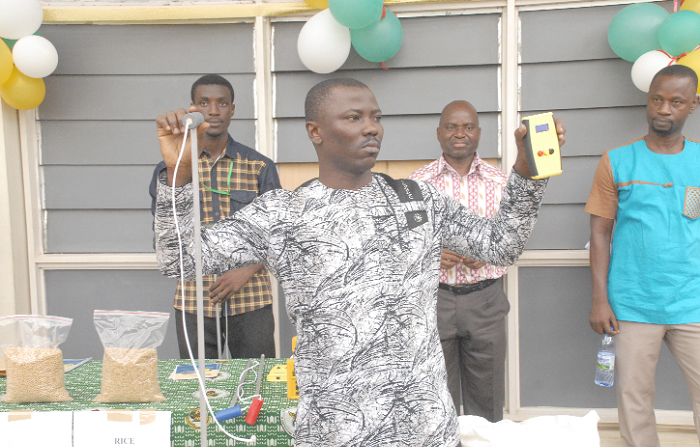
KNUST develops post-harvest loss control device for grains
A six-member research team, mainly graduates of the Department of Agricultural and Biosytems Engineering of the Kwame Nkrumah University of Science and Technology (KNUST), has successfully localised and assembled a moisture meter to mitigate post-harvest losses of various grains in the country, particularly maize.
The Post-Harvest Loss (PHL) moisture meter is made up of a thin long bar attached with a reading metre, which is inserted in bags of grains to assess their dryness or moisture level before they are stored or sold.
The measurement is used to ensure that the grains maintain the required moisture level for a particular weather condition and are ‘not bruised’.
The first batch of 50 PHL metres, approved by the Ghana Standards Authority, has been purchased by the United States-funded Assisting Management in the Poultry Layer Industry by Feed Improvement and
Efficiency Strategies (AMPLIFIES) with the expectation of increasing production to meet demand from Ghanaian farmers.
The local assembling of the meter has reduced the cost of each equipment from $1,500 as sold in the United States of America (USA) to $50.
The exercise was a collaboration between the United States Agency for International Development (USAID) -funded PHL Innovation Laboratory and the KNUST, which started in 2014.
Already, talks have begun between the university and the Ashanti Regional Director of Agriculture, Rev. John Manu, to produce the equipment en masse to feed the government’s flagship agriculture programme, the one-district, one-factory.
Research
The equipment was originally designed by one Dr Paul Armstrong in Manhattan, USA after which KNUST collaborated with the centre in the US to establish a laboratory in Ghana last year for the local assembly of the device.
A young engineer and senior lecturer at KNUST, Mr Joseph Akowuah, led the Ghana research team.
The team also included a young lady electrical engineer, Ms Anne-Marie Esaaba Abeasi, as well as a principal investigator, Dr E. A. Osekre.
Launch
The Dean of the Faculty of Civil and Geo-engineering of KNUST, Professor Eric Kwabena Forkuo, who launched the meters, said post-harvest losses contributed to food insecurity and low farmer incomes, especially in the tropics where greater losses were expected as a result of high temperatures and relatively low humidity.
Prof. Obiri-Danso expressed the hope that with the new equipment, the country’s crop yield would be secure and preserved to safeguard any possible food shortages.
The dean also commended the research team for its creativity, saying it gave more meaning to the university as a science and technology institution.
